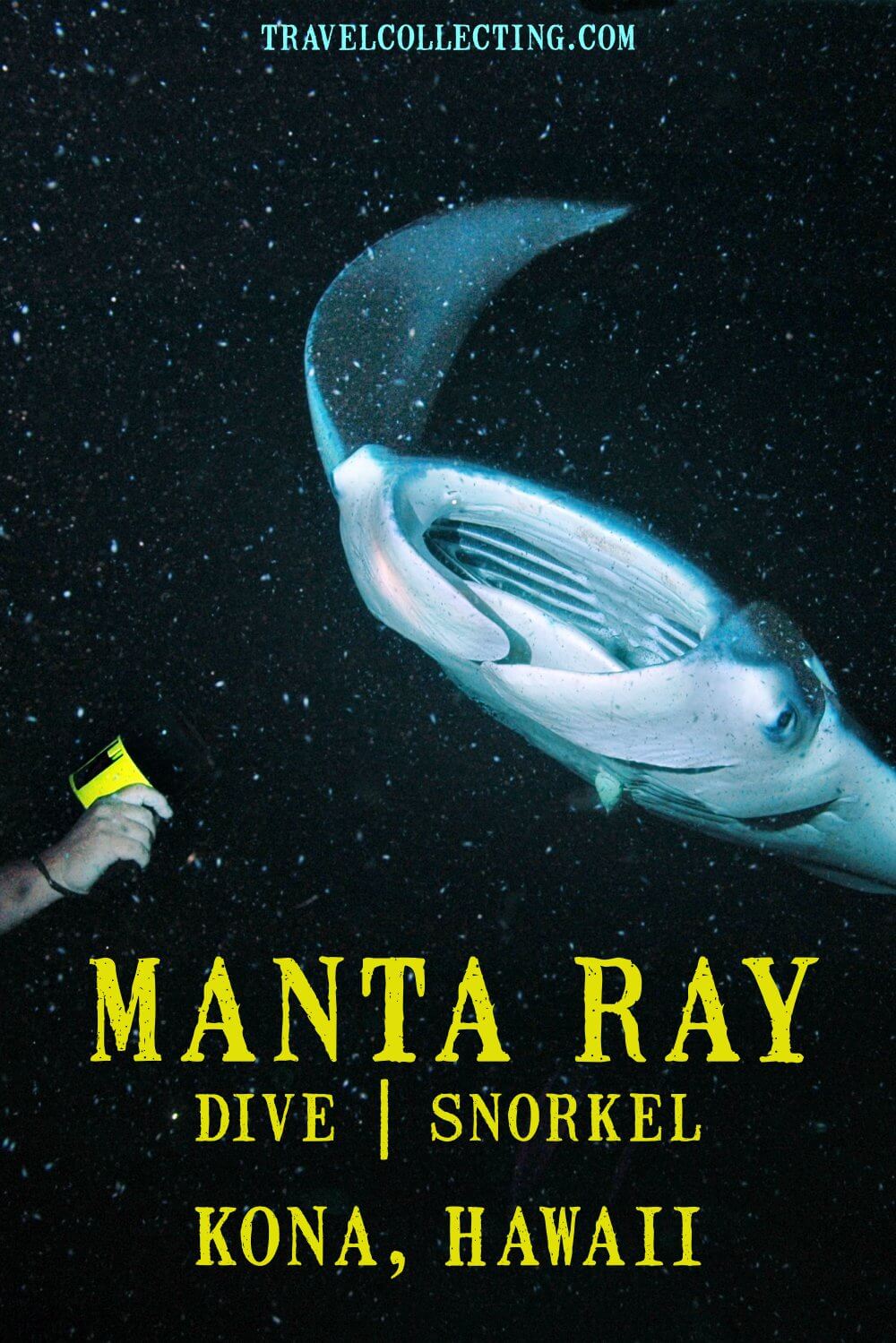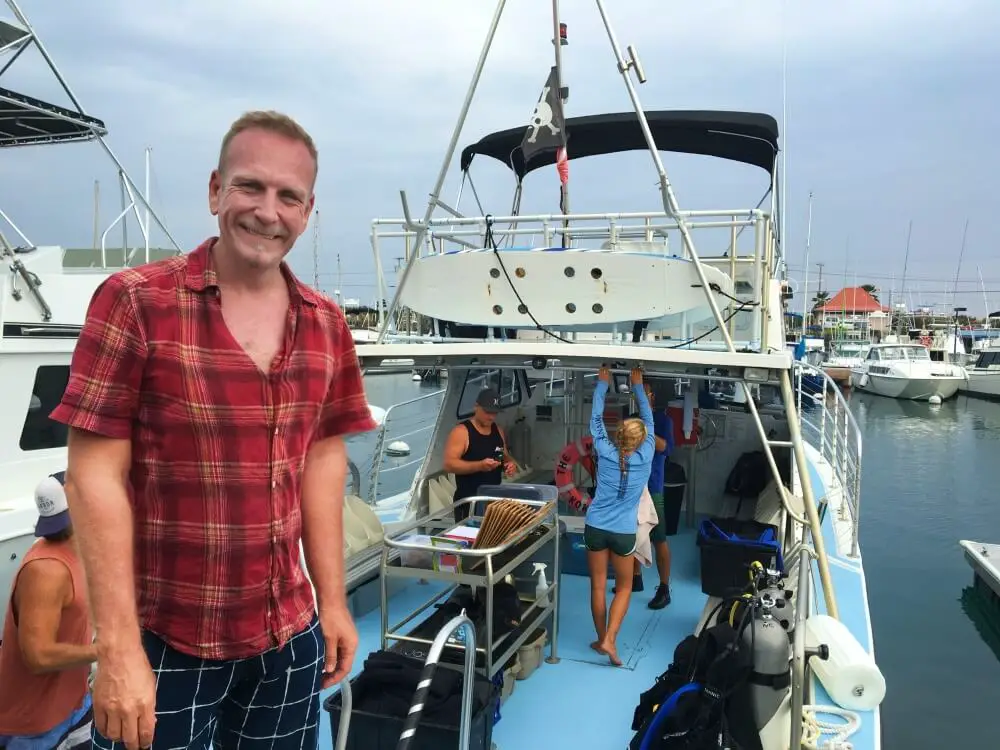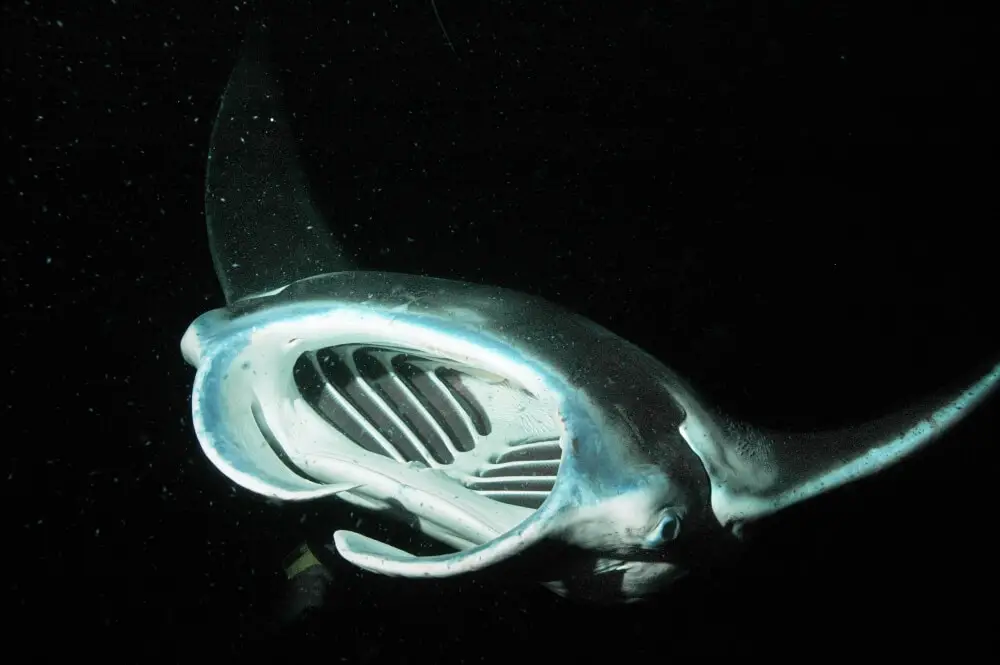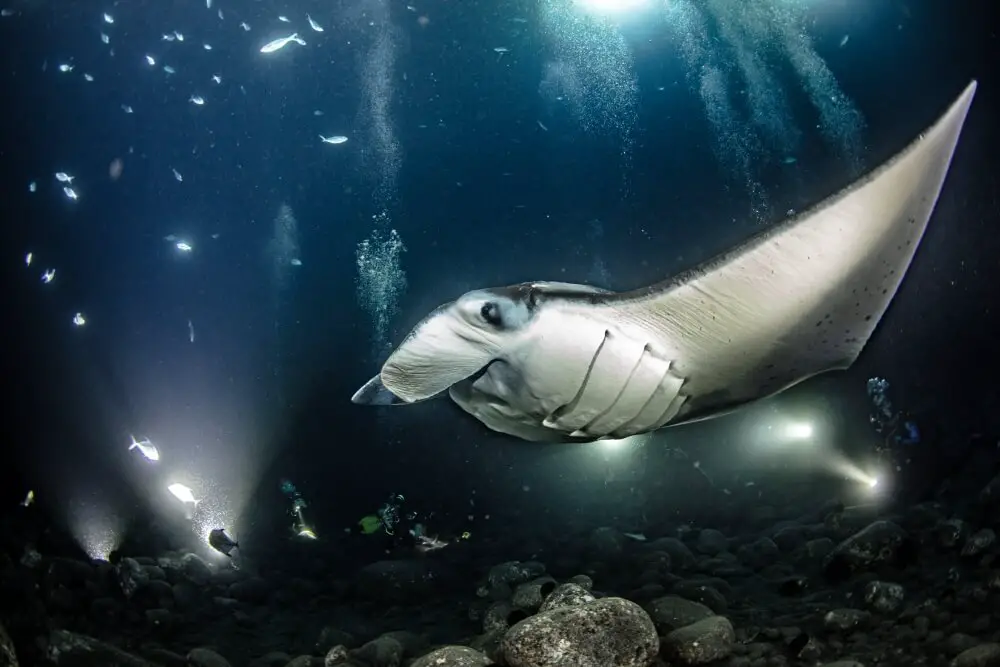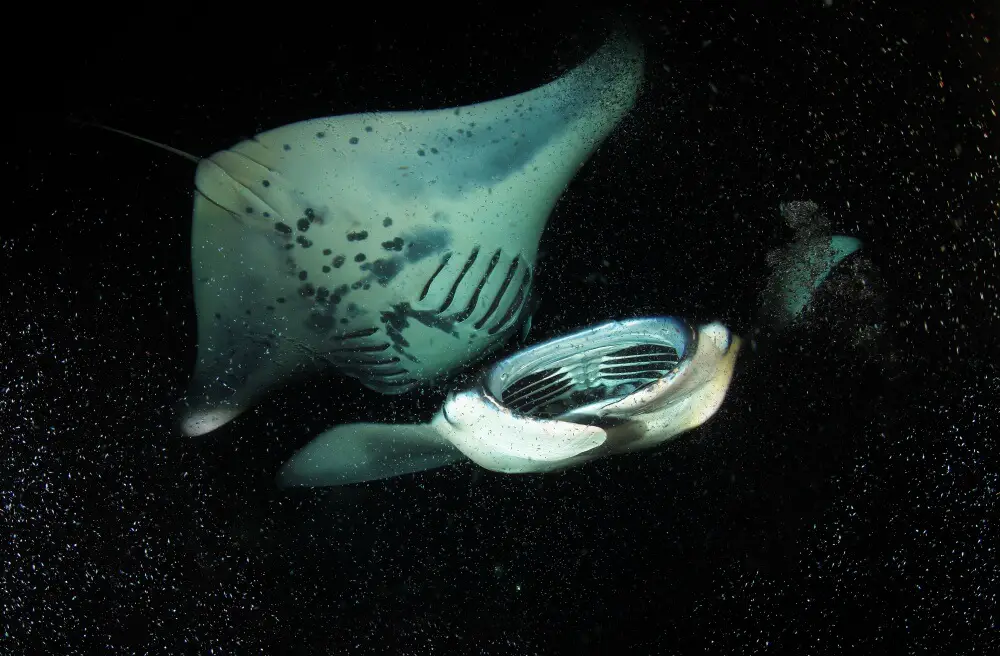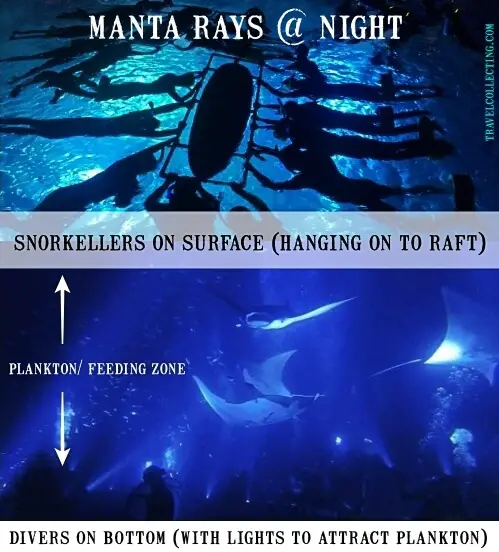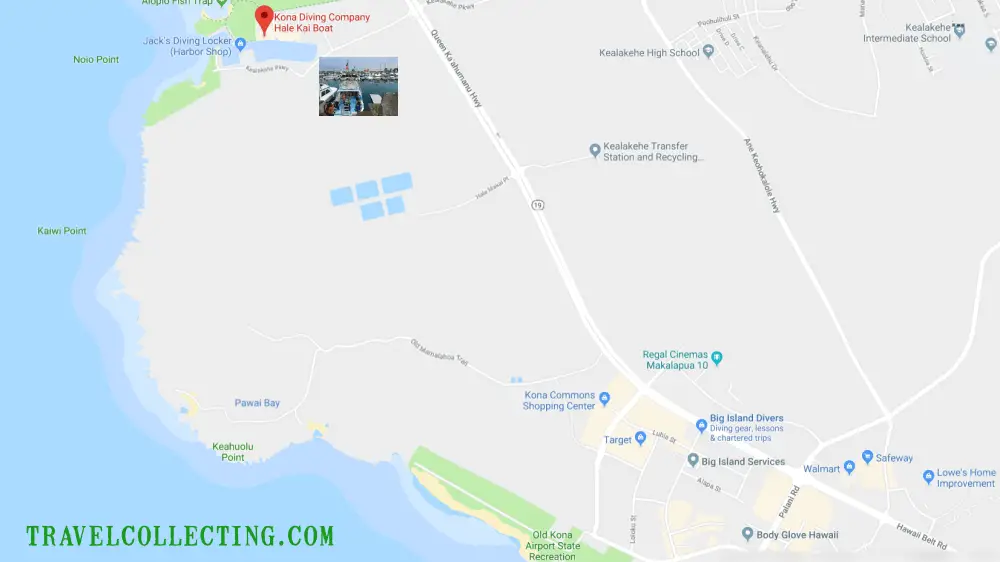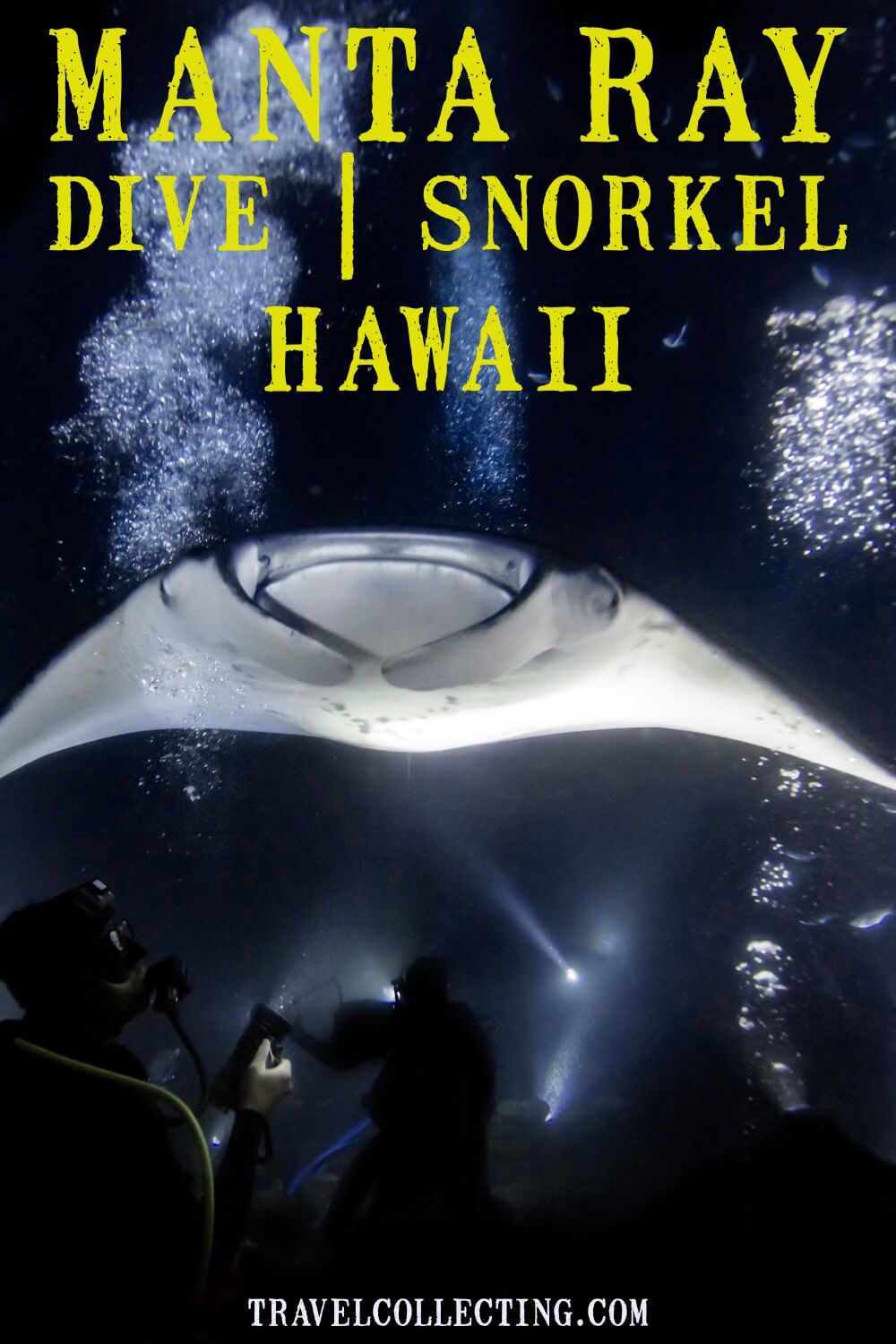Bright lights aim upwards, breaking through the gloom surrounding me. I swivel my head, looking around and up, peering into the darkness beyond the light.
Suddenly an enormous black creature swoops out of the dark, its enormous wings flapping slowly as it heads right towards me. It’s pale underbelly glows in the lights. It’s huge rectangular mouth gapes widely as it heads right towards me.
At the last moment, it sweeps overhead missing me by about an inch and glides away back into the dark. This is incredible!
No time now to read about swimming with manta rays in Hawaii? Pin it and save it for later:
Please note that some of the links below may be affiliate links. If you make a purchase through these links, I earn a small commission at no additional cost to you. Read my Disclaimer for more information.
Night manta ray snorkel, Kona | Manta ray night dive, Kona
After visiting Easter Island, I fell in love with the Pacific, so when I had a chance to visit Hawaii, I was super excited. For one thing, I love SCUBA diving. Kona, Hawaii is famous for its manta night dive, so this was my top priority on my visit to Hawaii.
I went to Hawaii on a work trip (yes, I know, it’s a hard life sometimes), but squeezed an extra few days’ vacation either side of the work, including a trip from Honolulu to the Big Island to do one of the famous manta ray dives of Hawaii. What I didn’t know at the time was that in Hawaii, manta ray snorkel trips are just as common and just as incredible.
Subscribe to monthly updates with tips for planning, travel inspiration and trip ideas and get instant access to the free PDF of this
Guide to Night Manta Ray Snorkel-Dive Hawaii
Getting to the boat
The harbor where the dive boats leave from is only about a 10-minute drive north of Kona, but I drove around the harbor area for ages trying to find the right dock following the directions given to me. You miss one turn and you’re screwed, but I did eventually find it. Fortunately, I’d left plenty of time.
Map of Honokohau Marina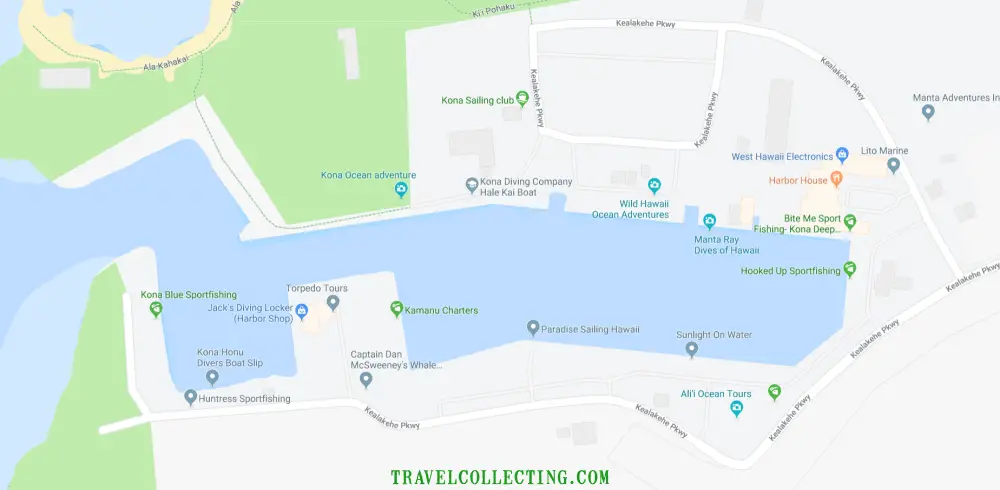
My boat had several divers, and as usual, the dive and boat crew were super friendly. To do a night dive, you need to be an Advanced certified diver, but I’d done my first dive in a few years just a few days before, so I was a little nervous. They put me at ease, which I appreciated. I didn’t need to be nervous – it was a very easy dive.
The start of the dive
A pleasant late afternoon ride along the coastline saw us heading towards the airport area. We arrived at Makako Bay just as the sun was setting. There were a couple of dive boats there already, and more arrived soon after.
Map of dive boat route from Honokohau Marina to manta ray dive site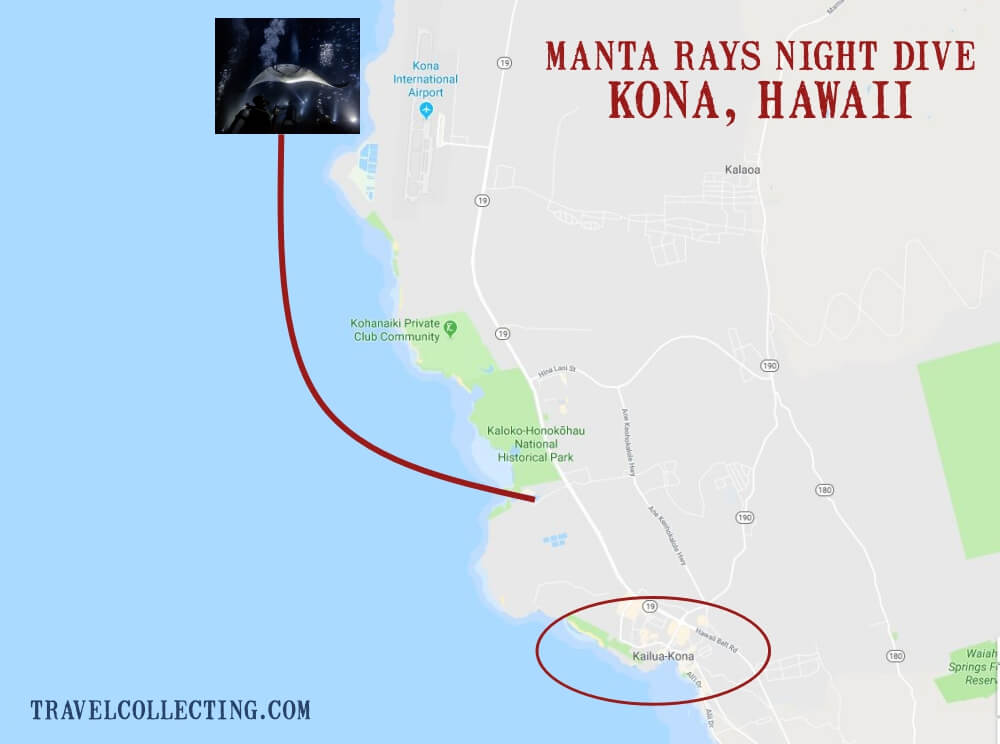
We entered the water just as it was starting to get dark, before most of the divers. I was buddied with one of the dive masters from the trip, and we took our time diving slowly around the area, and saw a couple of tiny nudibranchs, which are always cool.
Then we settled in just behind one of the huge spotlights as soon as they were turned on. Getting there early meant I had a front row seat.
The manta rays arrive
I kneel on the bottom and put my flashlight away, as the spotlights are sufficient. I peer into the dark, waiting for the manta rays to arrive.
After about 5 minutes, the first one arrives, aiming right for me, swimming overhead not much more than an inch from the top of my head.
Two more enormous rays sweep through the water further above me. They look like the alien creature from the movie The Abyss.
The rays are dark, with some patches, but their underside is white and they glow in the lights as they glide and swerve for food, performing an incredible underwater ballet. More join them, as they swoop and somersault around each other, coming out of the dark and heading back into it. We divers are silhouettes hanging at the bottom.
Far above us, rafts with snorkelers hanging on make dark patches in the light.
The enormous creatures glide around. Their giant rectangular mouths are covered in wide grills and gape widely as they scoop up invisible plankton. They turn over and sweep just below the surface – and the snorkelers who are clinging to the rafts.
My heart thumps, not with fear – with pure adrenaline and excitement at witnessing these incredible giants. I stare and stare, swiveling my head to see them as much as possible as they dance gracefully around. I am elated, excited, in awe, and humbled. My air runs low and I need to resurface long before I am really ready.
The verdict: Night swim with manta rays, Kona
As a SCUBA diver, the manta dive, Kona was top of my list of things to do, especially after my previous experience manta ray diving in Thailand, which had blown me away. But that was just one ray during the daytime and I really wanted to see a manta ray at night.
This was a night dive and there were about a dozen rays. And they got so close. It was incredible. Definitely one of the top dives of my life. Possibly, dare I say, one of the world’s best night dives.
I didn’t do the snorkeling, but the snorkelers on our boat all shared how close the rays were to them as they glided upside down near the surface.
So I feel confident saying that the Hawaii manta ray night snorkel would not only be the best snorkeling on the Big Island, but probably one of the best snorkeling experiences in the world too. It was that cool!!
The Experience: Manta ray night snorkel, Kona
It’s hard to know who provides the best manta ray night snorkel. Kona has plenty of operators to choose from and they are all pretty similar. Manta ray Kona snorkeling involves spending most of the time holding on to a raft, so calmer conditions are best.
If you have some flexibility, try to choose a night with calm seas. I did hear some people later in my trip saying they had done the manta ray night snorkel and they had sore shoulders from hanging on in a slight swell.
Book the night snorkel right here:
The Experience: Manta ray night dive, Kona
Kailua Kona diving is more than just manta rays, but the Big Island manta ray night dive is definitely the main attraction. This dive is mostly spent kneeling on the bottom of the bay, gazing around at the manta rays swimming into the light from the dark, dancing as they swoop for plankton, and then disappearing back into the dark.
The dive is not technical or difficult. Nor is it a solitary experience. There are a couple of dozen other divers at least. I liked the fact that we got there early and many of them were behind me, so I wasn’t actually aware of many of them until out air ran low and we left.
How the dive site works
Why do you see manta rays at night? Manta rays are filter feeders. They eat plankton. Plankton are attracted to light. The dive companies have set up huge spotlights on the ocean floor about 33 feet/ 10 meters underwater in Makako Bay near Garden Eel Cave. The manta rays come to eat the plankton.
For the manta ray Big Island night dive, divers sit on the bottom just behind the lights. Snorkelers stay on the surface, holding on to the edges of a giant rectangular floating raft. This enables them to all stay together and float easily face down in the water.
Manta rays swoop to eat the plankton that is all around between the lights (just above the divers) and the surface (just below the snorkelers).
Book a two-tank night dive with manta rays right here:
➡️ If you want a shorter night, book a single dive
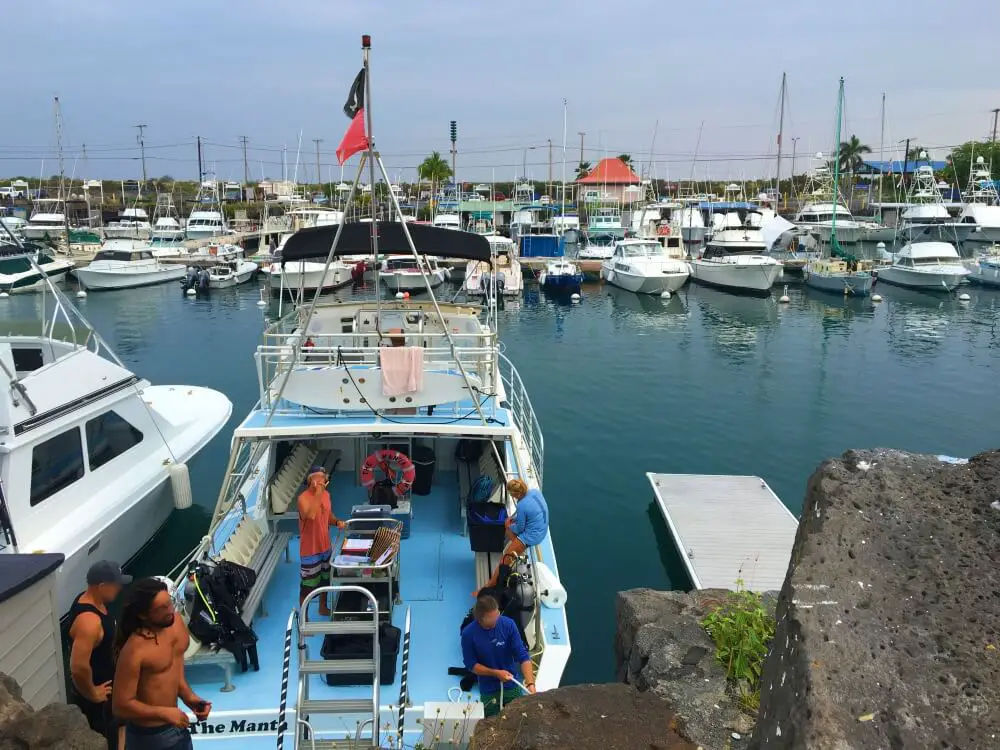
Read about more diving in Hawaii here.
Other things to do in Hawaii
One of the great things about Hawaii is that there are so many different experiences that you can have, and there are plenty of other awesome things to do on the Big Island. A top pick is to visit Hawaii Volcanoes National Park! Missing out on the chance to see actual lava flowing from an active volcano would be a real shame when you’ve come this close.
In addition to the awesome manta ray dive, Kona Hawaii and the surrounding areas have plenty of great places to go snorkeling. In fact, I spent most of my time on the Big Island in the water. Here are the top places for snorkeling around the Big Island.
I recommend that you also spend time on some of the other islands, especially Oahu and Kauai. Here is a detailed itinerary and guide for Oahu to help you plan.
Snorkel & Photography Equipment
A word of advice – wear a swim shirt if you’re snorkeling during the day! Obviously you won’t need it for this night swim, but if you do other snorkeling during the day, it’s a must-have. I wore sunscreen and still ended up getting my back incredibly sunburned because I was face down in the water for hours enjoying the snorkeling. Check prices on Amazon here.
Two other things you will need is a snorkel and a pair of fins. I always take mine with me, so I don’t need to rely on a rental and can to any of these great snorkel spots at any time.
Kevin is a little afraid of the water and absolutely fell in love with this full face snorkel – it makes it much easer and reduces the chances of drinking water unintentionally.
The other thing you need is a good pair of fins. I like the open heeled ones, as you can easily adjust them to any size, plus they don’t give me blisters and are much easier to get off, as you just release the clasp.
If you are taking your family on this trip, check out the best snorkel gear for kids. Although snorkeling equipment is supplied, I always like having my own snorkel gear as it fits so much better and is more comfortable then rentals.
If you’re interested in taking some photos, you’ll also want a good quality underwater camera. Check out the GoPro Waterproof Dome.
Here is a comprehensive list of things to do on Hawaii’s Big Island to inspire you and help you plan your travels.
Some fun facts about manta rays
- What is a manta ray? A manta ray is the largest of the rays, a type of fish.
- There are two species of manta rays: the reef manta (Manta alfredi) and the giant manta ray (Manta birostris). The manta rays at Kona are mostly the reef mantas (Manta alfredi).
- Manta rays have the largest brain of all fish and the largest brain/ body ratio of all fish.
- Manta rays have a membrane/ mucus over their body to keep out infection, so you should never touch them, as this removes this mucus and opens them up to the risk of infection.
- Unlike stingrays, their tail spike is not venomous.
- They do not lay eggs; instead, they give birth to live pups.
- How big are manta rays? Manta rays are huge. So, how big do manta rays get? A typical manta ray wingspan is between 18 and 23 feet (5.5 and 7 meters). birostris reach at least 23 feet/ 7 meters wide, while M. alfredi, which are the ones at Kona, reach about 18 feet/ 5.5 meters wide. The largest manta ray found was actually almost 30 feet/ 9 meters wide. That’s big!
Where can you swim with manta rays, Hawaii?
The best place to see manta rays is definitely the Big Island, near Kona. The best place to dive with manta rays is “Manta Heaven”, as Makako Bay is often called. It’s not far offshore near the Kona airport. This is where the manta ray night dive Kona Hawaii that I described is.
Although this is the best place to snorkel with manta rays, there are a couple of sites for the dive/ snorkel operators to choose from to ensure the best manta night dive. Kona has mantas all year round, but weather conditions vary, so having some flexibility is helpful.
Where is Kailua-Kona, and what is the currency?
Kailua-Kona (most often just called Kona) is on the east side of Hawaii island (called the Big Island because, well, it’s the biggest island in Hawaii, and otherwise it’s confusing as you whether you are talking about Hawaii the island, Hawaii the archipelago or Hawaii the state).
Hawaii is in the middle of the Pacific Ocean, but is one of the states of the United States, so the currency is the U.S. dollar (USD).
Best time to do the Hawaii manta ray night dive or the manta snorkel
The best time to visit the Big Island, Hawaii
In general, winter (November to March) is considered the best time to visit the Big Island. Temperatures are mildest then, although Hawaii’s weather is temperate year-round, almost never going higher than 95°F/ 35°C.
The winter months also tend to have the clearest skies, so if you are heading up to the observatories, this is the best time of the year for stargazing. This is also the season when whales pass Hawaii on their migration.
However, these also tend to be the windiest months, which affects diving.
The best time to do the manta ray night dive, Kailua Kona
What’s the best time to see manta rays in Hawaii? Well, to know when’s the best time to see manta rays in Kona, you need to know a little about the Big Island’s weather.
In winter, the main winds – and therefore swells – come from the northwest. The Big Island is in the lee of the Hawaii island chain, which makes the water much calmer than Kauai, for example, which takes the brunt of the winter’s northwest swells.
Although the Big Island does get the full force of the southwest swells, they tend to be smaller than the northwest ones, so Kailua Kona scuba diving is possible all year round.
The manta rays visit the Kona area throughout the year, so you can always swim with manta rays. Big Island weather does, however, tend to have higher swells in January and February because of the southwest winter winds, so there is an increased chance in these months that a trip might be cancelled due to the swells. So, the best time for manta rays in Kona is March – December, but any month is OK.
However, unless you’re planning to make a trip there just for the mantas, because the Big Island is best November-March, the absolute best time to swim with manta rays in Kona is November, December and March.
How to get to Kailua-Kona
The airport serving Kailua-Kona is Kona International Airport. There are direct international flights to many destinations, as well as many flights to/ from other Hawaiian Islands. Book a flight to Hawaii here.
Getting around the Big Island
Th easiest way to get around the Big Island is to rent a car, which is what I did. Search for rental cars at Kona Airport here.
However, if you are just staying at one resort, this may not be necessary. You can take a taxi to the boat harbor, from the airport, around town or even around the island.
Laura’s Taxi is a local option (Tel: +1-808-326 5466). They have preferred rates if you mention Kona Diving Eco Adventures Safaris or Manta Ray Dives of Hawaii.
Getting to Honokohau Marina
Most dive/ snorkel trips leave from the Honokohau Marina (though check with your dive/ snorkel operator to make sure!).
If you’re coming from the north, pass the Kona International Airport (or from the airport, turn right onto HI-19/ Queen Kaahumanu Hwy), go 4.5 miles, then turn right at the light on to Kealakehe Pkwy into the entrance of Honokohau Marina.
From Kona, take HI-19/ Queen Kaahumanu Hwy north towards the Kona International Airport and turn left at the light on Kealakehe Pkwy into the entrance of Honokohau Marina.
Map of Kailu-Kona to Honokohau Marina
Where to stay in Kona, Hawaii
There are plenty of accommodations options in and around Kailua-Kona. Few of them are super cheap, but there are three main options: hostel for budget travelers; bed and breakfasts or inns for a more comfortable and personalized experience; or the full “let’s escape and have an island fantasy vacation” option and stay in a resort.
Read my guide How to Choose a Hotel for tips on making the best choice for you.
Bed and Breakfasts
I like staying in bed and breakfasts, as they are more intimate than resorts (though splurging in a resort can be fun too, of course!) In Kona, they tend to be a little bit in from the beach (but not far), as they are where people actually live. Here are several popular choices:
The Hawaiian Oasis Bed and Breakfast has beautiful gardens and patio areas. It has a rating of 9.5 on Booking.com. Book the Hawaiian Oasis Bed & Breakfast here.
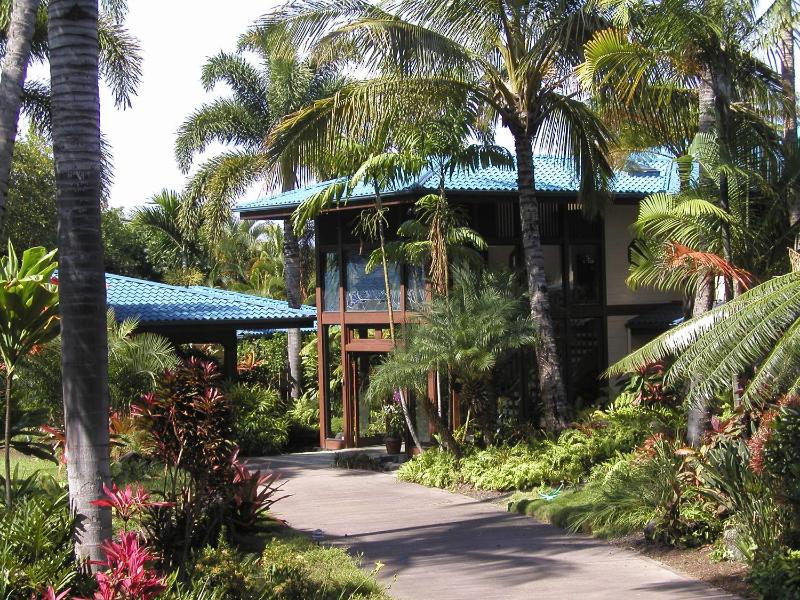
The Lilikai Inn is in neighboring Holualoa. There are also lovely gardens and a terrace with views of the coast. It has a booking.com rating of 9.0 Check availability at the Lilikoi Inn here.

The Hale Maluhia Country Inn is in Kona, just a little south of the city center. This also has lovely gardens and a terrace, as well as a hot tub. It’s booking.com rating is 9.2. Check prices, availability and book the Hale Maluhia Country Inn here.
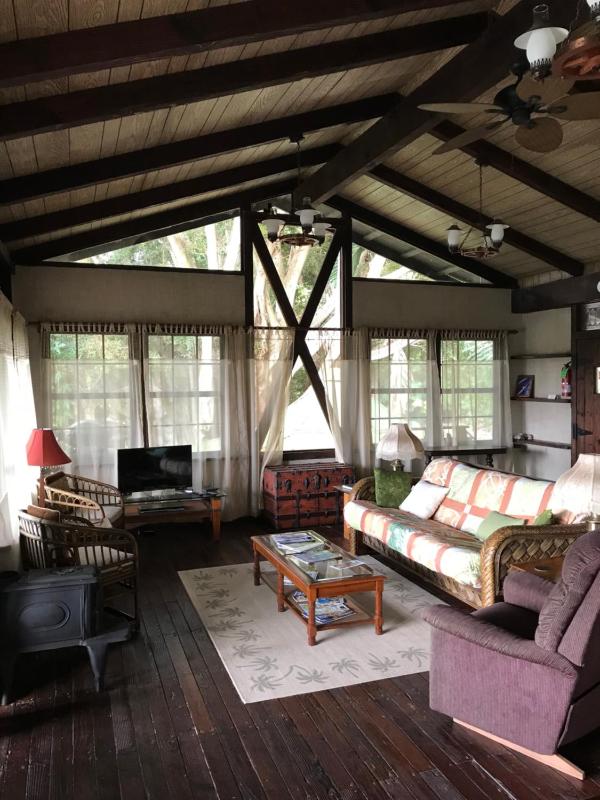
Resorts
Staying in a resort is the perfect way to relax and enjoy the sun and sand. Resorts tend to be right on, or very close to, the beach, so if this is a priority, this is definitely the way to go.
Kona Coast Resorts at Keauhou Garden have self-catered apartments with a kitchenette. And a pool, of course. It has a booking.com rating of 9.5. It’s slightly south of the Kona center, and the manta rays harbor is slightly north, but it’s still only a 15-20-minute drive. Book an apartment in Kona Coast Resorts at Keauhou Garden here.
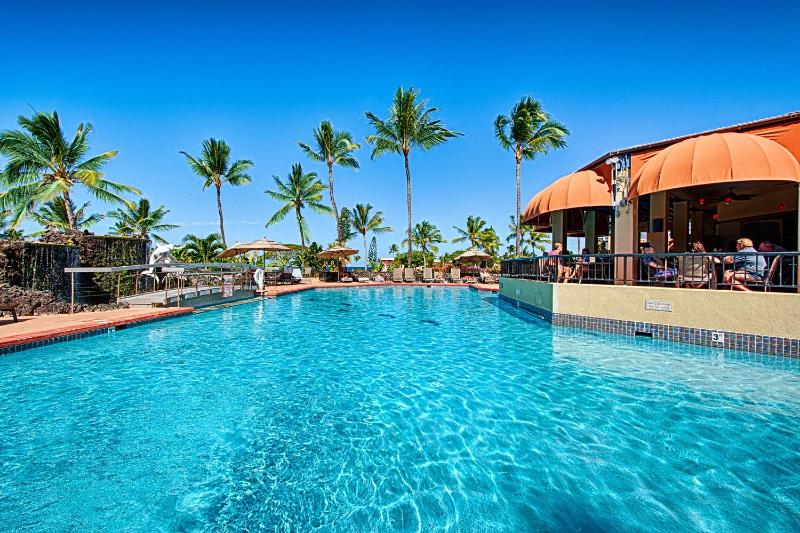
Not far away are the Beach Villas Kahaluu, which also has a pool. (Some) rooms have ocean views. Kahaluu Beach Park is across the street. It’s rating on booking.com is also 9.5. Check availability and prices at the Beach Villas Kahaluu on the Kona Coast here.
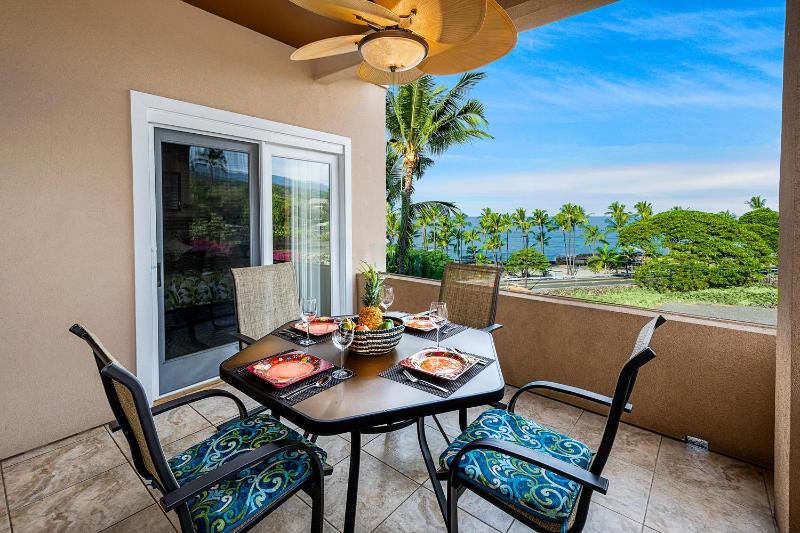
Planning and packing for Hawaii
I hope this blog post helps you plan your trip to Kona, the Big Island and especially the Kona night dive/ snorkel. However, it can also be helpful to use a guidebook to supplement this. I always look at both guidebooks and blogs. Lonely Planet, which I use for most trips, has a book on Hawaii and another one just for the Big Island. Buy the Hawaii Lonely Planet here and buy the Big Island Lonely Planet here.
Make your trip planning easier with my step-by-step Trip Planner.
When you are ready for your trip, check out my Essential Packing List. And don’t forget to pack a swim shirt, snorkel and fins (mentioned above).
Travel Insurance for Hawaii
A great insurance option is Travelex. It has coverage for all you’ll need. You can swap this link for either compare Travel Insurance plans here or get a quote right now:
Subscribe to monthly updates with tips for planning, travel inspiration and trip ideas and get instant access to the free PDF of this
Guide to Night Manta Ray Snorkel-Dive Hawaii
Happy diving/ snorkeling!
Do you have any great dive/ snorkel stories to share? I’d love to hear them. Comment below.
If you liked this post about the manta ray Hawaii night dive, please share the love and Pin it to your Hawaii and Dives boards!
Read about more dive/ snorkel experiences here:
- diving in giant kelp forests , Channel Islands, California
- more to come soon!
Other animal encounters:
- orangutans in Borneo
- pygmy elephants in Borneo
- giant tortoises, marine iguanas and much more in the Galapagos
About the author

James Ian has traveled to 83 countries and all 7 continents. He is passionate about experiential travel, i.e. meaningful travel that actively engages with the environment and culture. He helps people have similar experiences that involve active participation in activities and festivals; engaging with the local food and handicrafts through lessons and food tours; and interacting positively with environment by hiking, riding, rowing, diving and low/no impact animal encounters.
Travel Collecting is a participant in the Amazon.com Services LLC Associates Program, an affiliate advertising program designed to provide a means for sites to earn advertising fees by advertising and linking to amazon.com. Amazon and the Amazon logo are trademarks of Amazon.com, Inc. or its affiliates.

